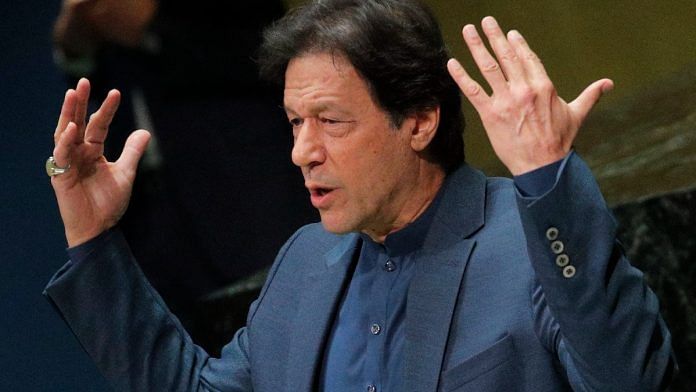New Delhi: If Pakistan recognises Israel, it loses “moral ground” on Kashmir, Pakistan’s ousted premier Imran Khan said in a recent interview.
In the interview to The New Yorker, Khan sought to draw parallels between the “disputed” nature of Israel and Kashmir for justifying his support to the Palestinians who are locked in conflict with Israeli forces.
“Because Kashmir is a disputed territory between Pakistan and India, we do make statements on that. About Israel, it was the stated position of the founder of Pakistan and the situation is similar to what is happening in Kashmir,” he said, responding to a query about him not commenting about China’s atrocities towards Uyghur Muslims.
“If we recognise Israel, we then lose the moral ground of holding on to Kashmir—that they should be given the right of self-determination or homeland. I speak on these two issues,” he said, in the interview published Sunday.
One of the most militarised places in the world, Kashmir has been a bone of contention between nuclear-armed India and Pakistan ever since the two countries became independent in 1947.
The Pakistan Tehreek-e-Insaf (PTI) chief highlighted Islamabad’s dependence on Beijing to explain how he had to be “selective” when it comes to supporting human rights.
“…when you become the Prime Minister, you have to think of the consequences of making a statement. Pakistan is heavily dependent on China. For Pakistan to make a statement, with the Chinese being very sensitive to such criticism, it could be very costly. That’s why I have to be selective when I say things about human rights,” he said.
Khan also described how Pakistan’s nascent years were akin to Israel’s after the former was carved out of India.
“Pakistan’s neighbour, six or seven times in size, is India. The state grew up with fear, much like in Israel, where there was this feeling that we have hostile neighbors much bigger than us, and therefore we need to protect ourselves. The reliance on security became paramount because there was fear that our existence was threatened,” he said, explaining how the military came into prominence in his country.
It was “too idealistic” to expect that Pakistan would suddenly become some Western democracy having absolute civilian supremacy, the cricketer-turned-politician said. “But we do hope to have some sort of a balance between the military and the civilians… A huge, immediate change is not possible, because our security apparatus has gotten very entrenched over the years.”
Also Read: Peshawar bombing shows Jihadist win in Pakistan’s north-west has far-reaching consequences
Balancing act with Army
Despite blowing hot and cold against the military after his ouster from power in April last year, Khan asserted that the Pakistan Army was the only institution intact in his country.
“Right now in Pakistan, there is only one institution that is intact and that gets things done. That’s the Army. And then we have unfortunately had these two crooked families who have weakened the institutions,” he said, referring to the Bhuttos and the Sharifs.
“If you want things done in Pakistan, it is a joint exercise between the civilian government and the apparatus of the military. … So let me just be precise: the power must lie with the civilian government, which has the public mandate to run the country. But the Army will always play a big part,” he asserted.
Khan reiterated his opposition to retired Army chief General Qamar Javed Bajwa whom he claimed “engineered the downfall” of his government.
“During my three and a half years in power, I would say that, for three of those years, the military and my government were on the same page. We had a very good working relationship. Whatever my policies were, they backed the policies. The military establishment, you must remember, is one man. The Army chief is all-powerful. So the only problem I had with him was, again, rule of law,” he said.
He also claimed the ex-army chief let the Pakistan Muslim League (Nawaz) and the Pakistan Peoples Party off the hook despite the National Accountability Bureau (NAB) — the country’s anti-corruption watchdog — making corruption charges in 2018.
“I wanted the cases to move forward. But the NAB was actually controlled by this one man, the Army chief, who would not proceed with accountability for these powerful politicians. I discovered that my whole theme—rule of law, bringing the powerful under the law—failed because the Army chief just did not consider corruption to be bad,” the PTI chief said.
To a query about how his vision for Pakistan has changed after he entered the world of politics, Khan recollected how he was struck by the rule of law in England where he studied and played cricket.
“I could compare and contrast life in Pakistan with life in England. And what struck me most were two things. One was the welfare state. Second, and most important, was the rule of law, because in Pakistan we had martial law …Half the time, we had these two crooked families — mafia families — running Pakistan.”
“This is a problem with the entire developing world: we do not have the ability to catch white-collar criminals because those in power weaken state institutions. Corruption is a symptom of there not being rule of law. So I wanted Pakistan to have rule of law,” he said.
(Edited by Tony Rai)
Also Read: Pakistani leaders want to ‘reimagine’ the nation but must cut lavish defence spending first



